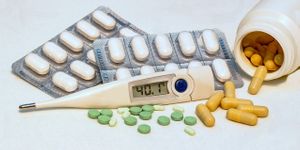Blissful Bugs: Probiotics Show Promise in Easing Depression and Now Anxiety
Major depressive disorder (MDD) affects millions of people worldwide, presenting a significant challenge for healthcare providers. Shockingly, over half of all patients do not respond to initial treatment options. In the United States, up to 17 million adults struggle with treatment-resistant depression, which fails to improve even with standard antidepressants.
It’s always comforting to have someone there to support you when you're feeling down. How about the support of trillions of probiotic bacteria to fight the blues?
Recent research has shed light on a potential alternative treatment for depression: probiotics. These beneficial bacteria have already proven their effectiveness when used alongside talk therapy or antidepressant medications. New research out of the United Kingdom on the safety of probiotics has also confirmed their efficacy in treating depression and anxiety.
intestinal wall pixabay
So, how do probiotics exert their influence on our mental well-being? The answer lies in the intricate connection between the gut and the brain. The gut, through its microbiota, interacts with the brain via the enteric nervous system. This intricate network of nerves, controlled by the vagus nerve, regulates various essential functions such as motor function, blood flow, immune and endocrine systems, and the movement of substances across the gut lining. While the enteric nervous system operates somewhat independently, it actively communicates and exchanges information with the brain.
Fascinatingly, studies conducted with germ-free rodents suggest a profound impact of gut microbiota on mental health. Some studies have demonstrated a breakdown in gut-brain communication without microbes. When germ-free rodents received fecal transfers from individuals with major depressive disorder, they began to exhibit depression-like behaviors.
The significance of the gut-brain connection becomes even more apparent when we consider that the gut synthesizes over 90% of the body's serotonin, a neurotransmitter closely associated with mood regulation. Microbiota play a vital role in this serotonin synthesis process, highlighting their potential influence on depressive symptoms.
To further explore the impact of probiotics on mental health, researchers in a new study from JAMA Psychiatry conducted a study focused on adverse effects. Nikolova et al. found the probiotic treatment group experienced no serious adverse reactions, leading to a high retention rate among study participants.
Moreover, the 24 participants who received probiotics reported a significant reduction in self-reported depression and anxiety symptoms after an 8-week course of probiotics. These findings align with previous reports, which have consistently shown improvement in depressive symptoms.
Improvement on Clinical Global Impression Improvement subscale, an assessment of depression. Nikolova et al, 2023, JAMA Psychiatry
Despite the positive outcomes observed, it is important to note that the clinical assessment of probiotics' impact on anxiety is still limited. Therefore, further research is warranted to fully understand the extent of probiotic activity in alleviating anxiety symptoms.
The encouraging results of this study and similar findings from previous research underscore the need for large-scale studies. By delving deeper into the potential of probiotics, we can uncover their full therapeutic benefits and pave the way for more effective treatments for depression.
In modern psychiatric practices, having a well-tolerated, effective, and adhered-to treatment for depression is crucial. Remarkably, probiotics offer not only potential relief from depressive symptoms but also additional advantages for immune function and digestion. These benefits make probiotics an exciting area of further larger-scale studies.
Sources: Therapeutic Advances in Gastroenterology, Science Translational Medicine, Cell, Frontiers in Neuroscience, JAMA Psychiatry










